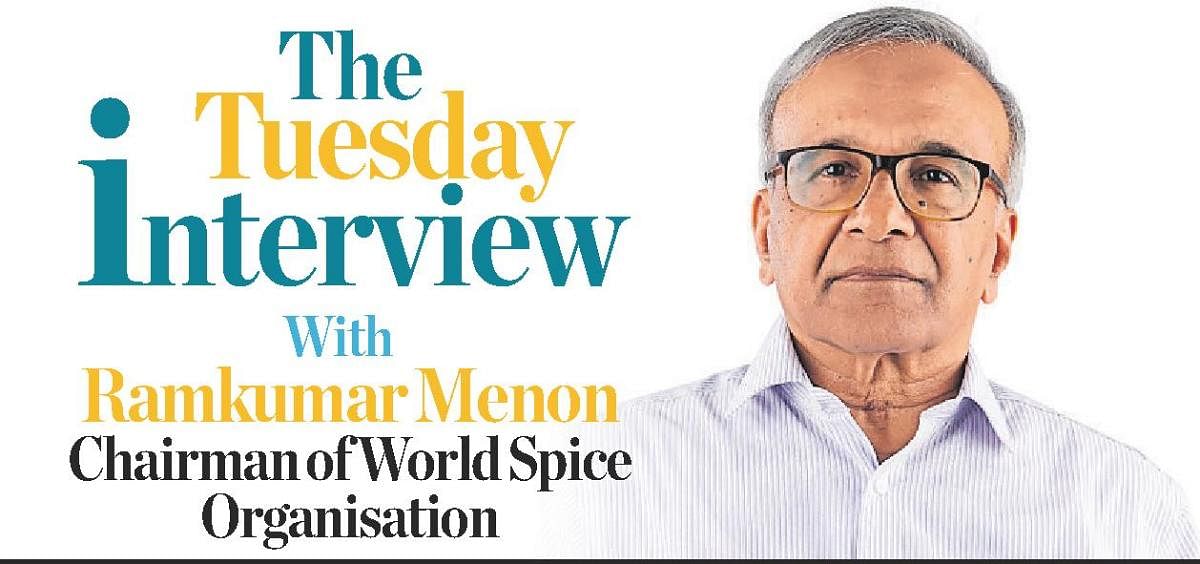
India is the world’s largest exporter of spices, but the industry is facing new challenges now, Ramkumar Menon, chairman of the World Spice Organisation, tells DH’s Dhanya Skariachan, as he discusses changing customer preferences and new global standards for safety, sustainability and traceability.
India contributes about 48% of the world’s spice requirements. Where do you see that number in five years?
We expect the contribution to increase to over 50% of the world’s spice requirements in volume terms. We expect that a significant shift in the composition of the products being exported will take place, with a likely increase in value-added spice exports.
What are the new challenges faced by the Indian spice industry?
Some of the newer challenges are the unrealistic and more stringent safety standards set by developed countries in their markets. Also, newer producers, especially from Africa, catering solely to exports, may enter the market. That will put pressure on our spice production and productivity strategies, given our large domestic and export market requirements. Another challenge likely to become more complex is the lack of harmonisation in quality and safety standards in producing and consuming countries, which will make it difficult to operate the supply chain optimally.
How hard is it for our companies to meet international safety, sustainability and traceability standards?
Though safety standards are becoming more stringent, and in some cases unrealistic, given India’s experience, its vast pool of expertise and R&D institutions as well as the expertise of our farmers, and with proper training of all stakeholders in the supply chain, starting from the farm level, it will be possible for Indian companies to meet international, realistic standards.
What are you doing to improve the quality and safety of spices sold in India?
We are conducting training and awareness programmes to make farmers and processors aware of the standards, and (urging them) to follow good agricultural and manufacturing practices so that good quality and safe spices are produced. WSO, in collaboration with Spices Board, IDH-the Sustainable Trade Initiative (Netherlands), GIZ (Germany) and the Rainforest Alliance, started the national sustainable spice programme to promote the production of safe spices. These programmes are being conducted at the farm and community level so that the right practices are adopted there.
What should the government do to curb adulteration?
Government should create awareness on food safety and adulteration issues amongst consumers so they can take precautions.
What needs to be done for better food safety regulation?
The food safety regulations are more or less in place, except that in some cases, it may need amendments to make it more practical and achievable. However, regulations by themselves cannot help reach the desired level. Enforcement and implementation are critical factors.
How would you rate India’s agricultural policies? Which are the ones that need urgent reform?
India’s agricultural policies are on the right path. Otherwise, we would not be witnessing the year-on-year growth we see in our major crops. However, we are still very much prone to the vagaries of climate and to pest and disease attacks. It would be prudent to develop and adopt newer technologies for pre- and post-harvest practices, which will make us less dependent on the monsoon and grow pest-and-climate-resistant crop varieties. This will ensure the security of the produce and the farmer’s livelihood. We feel urgent reforms are required in our pesticide and fertiliser regimes so that safe and green pesticides are
used in our spice and other crops and the health of our population is not endangered. Besides this, a policy direction
is required to tackle the growing shortage of farm labour before it becomes a major issue.
Do we have a good supply chain in place? Tell us about the evolving role of farmer producer organisations (FPOs).
The supply chain is, at best, adequate. It requires major changes to accommodate the growing requirements of the market in terms of quality and food safety. The importance being given by the government to FPOs at the farm level is a welcome step, especially for the spice industry, since most of the farmers are small and marginal farmers and it becomes difficult for both seller and buyer to deal in such small quantities. FPOs can act as aggregators and make transactions simpler. The National Sustainable Spice Programme (NSSP) of WSO uses FPOs as the contact point through which we conduct our awareness and training programmes. It is also possible for buyers to establish direct market linkages with the farmers with the help of FPOs.
How have consumer preferences in spices changed over the years?
Consumer preferences in India have changed over the years with a slow but sure shift in spice consumption from the unorganised sector to the more organised industrial and retail sector. This shift is expected to pick up as the economy improves and becomes more developed. However, the market continues to be dominated by the wholesale and loose sales market; the organised sector is growing by 6-8%. A similar change was noticed in the developed economies as they matured, and spice consumption in the industrial sector became the largest -- even more than the retail sector -- because the use of spices increased in convenience foods, nutraceuticals, etc.